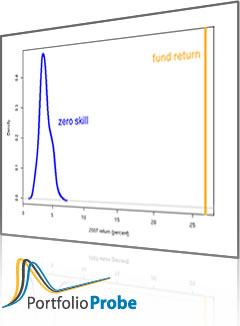Summary
Compare performance of a fund with the mean return of a set of random portfolios that obey the constraints of the fund.
Description
If there is a performance fee, it should not be relative to an index. Assuming the index is cap-weighted, such a performance fee would mostly be a bet between the investor and the fund manager on the outperformance of large caps versus small caps. There would be vanishingly little effect from skill.
Intuitively we think that a performance fee should be rewarding the fund manager for adding value to what the investor would get from someone with no skill. That is precisely what we are doing when we base a performance fee on the mean of the returns of a set of portfolios that the fund manager might hold.
The set of random portfolios should be generated at the start of the time period for the fee.
Another problem with performance fees is the possibility of the fund manager gaming the fee. If there are overlapping periods for the fee, then gaming is severely restricted. For example the evaluation period could be a year, but a fee is paid every quarter.
